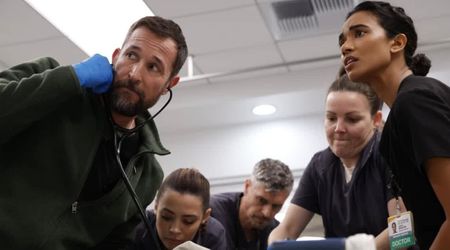‘Truth Be Told’ revolves around wrongful conviction of Warren Cave: The most heartbreaking miscarriages of justice in US history

‘Truth Be Told’, Apple TV+’s crime/legal drama traipses around the idea of wrongful convictions. The show follows investigative journalist and true-crime podcaster Poppy Parnell’s (Octavia Spencer’s) journey in retracing the events of a 19-year-old murder case, where a 16-year-old boy was tried and convicted as an adult.
The show provides a perfect opportunity to look at the pandemic of wrongful convictions in the U.S.; and how many are still recovering from it, if at all. According to the Innocence Project, an organization whose mission is to free “the staggering number of innocent people who remain incarcerated, and to bring reform to the system responsible for their unjust imprisonment”, in 2018 alone, the nine innocent people they had exonerated had spent a combined duration of more than 200 years in prison.
If the numbers are disturbing, reading the stories of the exonerees only adds to the disgust for the flaws in the criminal justice system. While in ‘Truth Be Told’, Warren Cave, the boy who was convicted of the murder was white, the reality of the situation is that it is often more people of color who face the brunt of wrongful convictions.
Yes, the issue of race is addressed in the show, but not in the way it usually plays out. Take, for example, the case of 60-year-old Horace Roberts, who was released from a California prison on October 3, 2018, after DNA evidence exonerated him in the 1998 killing of his former girlfriend and co-worker.
According to the New York Times, in 1999, Roberts was found guilty of second-degree murder and sentenced to 15 years to life in the killing of Terry Cheek, a co-worker he had supervised at Quest Diagnostics and with whom he had been having an affair.
“I could not believe it was me walking out of prison,” Roberts said after his release. “When you are in prison, you do not know if you will ever get out.” He added, “I went and had me a Southern-style breakfast. I had sausage, biscuits over gravy and hash browns. I had not eaten like that since 1998, so it was really good.”
A case that is now ubiquitous to the narrative of wrongful conviction and the racial undercurrents in the system is that of a group of then-teenagers, now famously known as the “Central Park Five”.
Dramatized by Netflix in ‘When They See Us’, the fateful incident that led five teenagers of color to be imprisoned, took place in 1989, when a 28-year-old white woman, who had been out jogging in the park, was found beaten and raped. Police subsequently arrested Kevin Richardson, 14, Raymond Santana, 14, Antron McCray, 15, Yusef Salaam, 15, and 16-year-old Korey Wise.
Salaam and Santana served six years and eight months in juvenile detention from 1990 to 1996 and was released on parole. Santana, in 1998, violated his parole and was sentenced to up to seven years in prison on drug charges.
He was released and exonerated in 2002. Richardson served seven years in juvenile detention from 1990 to 1997 and was released on parole. McCray served six years from 1990-1996 and was released on parole. Wise served 13 years and eight months in multiple state prisons.
It was only after Matias Reyes, who had actually assaulted and raped Meili, confessed that Wise was released in 2002. A story that made the news recently was that of Alfred Chestnut, Ransom Watkins, and Andrew Stewart.
In November 1983, 14-year-old DeWitt Duckett was shot in the neck in a Baltimore high school over his Georgetown Starter jacket. The three aforementioned boys, then aged only 16, were arrested, convicted and sentenced to life in prison. The three, now in their 50s, were all released from prison on November 18 — fully exonerated after spending 36 years incarcerated for a murder they didn't commit.
Perhaps one of the most famous cases in the history of racially motivated wrongful convictions is that of Walter McMillan, an African-American pulpwood worker from Monroeville, Alabama. McMillan was wrongfully convicted of the murder of 18-year-old Ronda Morrison, a white dry-cleaning clerk.
McMillian, who had no prior felony convictions, was arrested in June 1987, and oddly, in what the New York Times called "an extraordinary move, was immediately sent to Alabama's Death Row", without having stood trial. McMillian awaited trial for the next 15 months, which was relocated from Monroe County, an area that was 40 percent black, to Baldwin County where 86 percent of the residents were white.
The jury recommended a life sentence, after ignoring multiple alibi defense witnesses and despite the lack of physical evidence implicating McMillian. However, on September 19, 1988, Judge Robert E. Lee Key Jr., according to the National Registry of Exonerations, overrode the jury’s recommendation and imposed the death penalty.
McMillian's conviction was overturned by the Alabama Court of Criminal Appeals in 1993 and prosecutors agreed the case was mishandled. McMillian was released in 1993 after spending six years on death row for a crime he did not commit.
‘Truth Be Told’ is available for viewing on Apple TV+.










